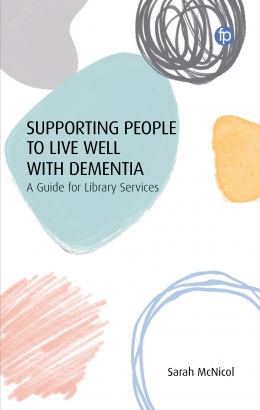
Primary tabs
You don't need to be an ALA Member to purchase from the ALA Store, but you'll be asked to create an online account/profile during the checkout to proceed. This Web Account is for both Members and non-Members.
If you are Tax-Exempt, please verify that your account is currently set up as exempt before placing your order, as our new fulfillment center will need current documentation. Learn how to verify here.
- Description
- Table of Contents
- About the author
Libraries have enormous potential to support people with dementia and their caregivers, and demand for dementia-friendly library services is only likely to increase in the future as the numbers of people affected by dementia rise and there is greater emphasis on community-based care. Taking action to create a dementia-friendly library can initially feel like a massive undertaking, but small changes can make a big difference.
Supporting People to Live Well with Dementia describes how to effectively develop, promote and evaluate services for people with dementia. It provides readers with an understanding of the different ways in which library customers may be affected by dementia, and an appreciation of some of the ways they can continue to contribute positively to their communities. It then suggests ways in which libraries can better support people with dementia and their caregivers through approaches to customer service, design, resources, reading interventions, online provision, and a range of other activities that promote more positive and inclusive attitudes towards people living with dementia amongst library staff, customers, and communities more widely.
Introduction
What is dementia?
Types of dementia
Stages of dementia
Understanding dementia
Potential impacts on the use of library services
Person-centred care
Conclusions
Supporting people living with dementia and their carers
Social model of disability
Supporting library customers with dementia and their carers
Support for library staff affected by dementia
Training opportunities
Conclusions
Library design and environment
Finding the library
Getting around the library
Case studies of dementia-friendly library design
Sensory spaces
Conclusion: maintaining dementia-friendly library design
Reading and Dementia
Dementia and imagination
Dementia-friendly reading materials
Reading activities for people with dementia and carers
Conclusions
Health, social and arts activities
Health and therapy-informed activities
Activities supporting social connections
Arts-related activities
Conclusions
Digital and online provision
Online activity provision for people with dementia
Other technologies for people with dementia
Online provision for carers
Conclusions
Partnership working
General partnership schemes
Library-specific partnership schemes
Conclusions
Communications and marketing
Language and terminology
Design of communications materials
Working with the media and other partners
Conclusions
Evaluation and service development
Key concepts
Recruiting participants
Evaluation and research methods
Ethics
Conclusions
Future Trends
Demographic changes
Changes in care provision
Conclusion: future library provision for people with dementia and their carers
Summary: Ten actions for dementia-friendly libraries
Sarah McNicol
Sarah McNicol is a research associate at the Education and Social Research Institute, Manchester Metropolitan University, UK. She has worked as an Information Studies researcher since 2000, and has particular interests in information literacy, lifelong learning, and school and children's libraries. She has published widely in the information studies field and has previously guest edited a number of journals, including Library Review and Library Trends.


